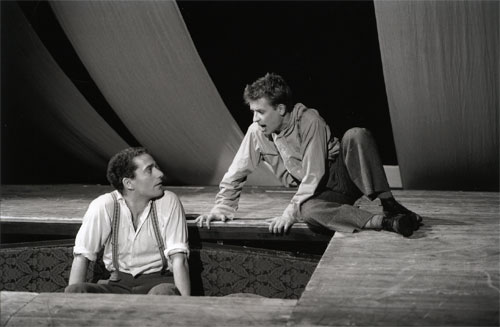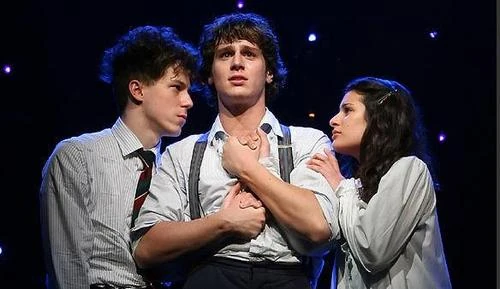(Fixed his relationships with moritz) Tags: Visual edit apiedit |
(Undo revision 4803 by 45.19.107.189 (talk)) Tag: rte-wysiwyg |
||
| Line 32: | Line 32: | ||
Melchior Gabor is a fourteen year old school boy living in Germany in the 1890's. Melchior is frustrated because he understands that the society in which he lives is actually hiding an abundance of information from its youth. Melchior is often described as a radical throughout both the play and the musical adaptation of Spring Awakening. In the play, Melchior has been noted to be in the top three of his class, and could be higher if he wanted to. In both the play and musical he is perceived as headstrong, handsome,and charismatic, leading to him being liked by both his teachers and his peers. |
Melchior Gabor is a fourteen year old school boy living in Germany in the 1890's. Melchior is frustrated because he understands that the society in which he lives is actually hiding an abundance of information from its youth. Melchior is often described as a radical throughout both the play and the musical adaptation of Spring Awakening. In the play, Melchior has been noted to be in the top three of his class, and could be higher if he wanted to. In both the play and musical he is perceived as headstrong, handsome,and charismatic, leading to him being liked by both his teachers and his peers. |
||
| − | Melchior comes from a loving home, despite hints being placed in the play that he does not have the best or closest relationship with his father. However, Melchior does have a very close relationship with his Mother ([[Fanny Gabor]]), who has strived to bring him up into a liberal minded and forward thinking home. Despite being a year younger than his best friend [[Moritz Stiefel]], he knows much more than both him, and his other peers, about most topics, especially puberty and sexual education. |
+ | Melchior comes from a loving home, despite hints being placed in the play that he does not have the best or closest relationship with his father. However, Melchior does have a very close relationship with his Mother ([[Fanny Gabor]]), who has strived to bring him up into a liberal minded and forward thinking home. Despite being a year younger than his best friend [[Moritz Stiefel]], he knows much more than both him, and his other peers, about most topics, especially puberty and sexual education. |
== Plot == |
== Plot == |
||
| Line 40: | Line 40: | ||
=== Moritz and Melchior === |
=== Moritz and Melchior === |
||
| − | When they were young kids, Melchior and [[Moritz Stiefel|Moritz]] would play together (along with [[Wendla Bergmann|Wendla]] and [[Ilse Neumann|Ilse]]) and from this early interaction, a friendship developed between the boys. Despite the boys opposite personalities, they remained very good friends, even though the community did not understand their friendship. Moritz is terrified about what is happening to him, and cannot understand the complicated descriptions in books. To help Moritz, Melchior writes an essay, which circulates the school. In the play, he is uninterested in how the girl is feeling, but in the musical he is fascinated by it, actively putting himself in that place for the essay. |
+ | When they were young kids, Melchior and [[Moritz Stiefel|Moritz]] would play together (along with [[Wendla Bergmann|Wendla]] and [[Ilse Neumann|Ilse]]) and from this early interaction, a friendship developed between the boys. Despite the boys opposite personalities, they remained very good friends, even though the community did not understand their friendship. Moritz is terrified about what is happening to him, and cannot understand the complicated descriptions in books. To help Moritz, Melchior writes an essay, which circulates the school. In the play, he is uninterested in how the girl is feeling, but in the musical he is fascinated by it, actively putting himself in that place for the essay. The essay is used as evidence to get Melchior expelled after Moritz commits suicide, as the essay is seen as proof of not only Melchior's corruptions, but Melchior's 'motivation' to corrupt his peers. |
=== Wendla and Melchior === |
=== Wendla and Melchior === |
||
Wendla and Melchior have a strong attraction that is central to the play. It is both intellectual and physical. They are drawn together by a need to debate and question their society and they challenge each other intellecutally. There is a sadomasochistic streak in both of them that causes them to want to push and hurt each other. In addition there is a VERY STRONG sexual attraction from both of them towards the other but there is also a feeling of finally being understood. |
Wendla and Melchior have a strong attraction that is central to the play. It is both intellectual and physical. They are drawn together by a need to debate and question their society and they challenge each other intellecutally. There is a sadomasochistic streak in both of them that causes them to want to push and hurt each other. In addition there is a VERY STRONG sexual attraction from both of them towards the other but there is also a feeling of finally being understood. |
||
| + | That being said, Melchior exploits her attraction to him and instead of letting them be equals and explore this feeling together he overpowers her. This comes from an already stated desire by him (in the play) to have something he "has to fight for." He tells Moritz that he doesn't want his "bliss to come as charity." In the musical he says (of a woman having sex) "defending yourself until finally letting go and feel heaven break over you" implying that a woman should fight against the man and then give in at the very end (basically rape). |
||
| − | In the play, it appears that Melchior rapes Wendla, however, in the musical, it isn't quite rape. At first, Wendla protests, but after a minute or two of passionate kissing, she starts to enjoy herself and allows it to happen. SO, to clear things up : in the play, YES, it does appear to be rape, HOWEVER, in the musical it is not rape, as she agrees to it. |
||
| + | |||
| + | His rape of Wendla and his subsequent lack of remorse (His longing to be with her again) is proof to his mother that Melchior is not as innocent as she wants to believe, and so, allows her husband to send him off to a correctional/reformatory school. In both the play and the musical, the rape leads to Wendla getting pregnant and dying from a botched abortion. |
||
=== Masked Mystery === |
=== Masked Mystery === |
||
| Line 59: | Line 61: | ||
*When he learns of Wendla's death, he blames himself |
*When he learns of Wendla's death, he blames himself |
||
*His nickname is Melchi, seemingly given by Moritz. |
*His nickname is Melchi, seemingly given by Moritz. |
||
| − | *Queer subtext surrounds his relationship with Moritz |
+ | *Queer subtext surrounds his relationship with Moritz especially in the play with the Headless Queen parallels but they would be an incredibly unhealthy relationship as Melchior Gabor is literally a rapist. |
*Gavin Creel played Melchior in the workshop recordings. Johnathan Groff and Gavin Creel later dated, meaning Melchior dated Melchior. |
*Gavin Creel played Melchior in the workshop recordings. Johnathan Groff and Gavin Creel later dated, meaning Melchior dated Melchior. |
||
Revision as of 07:56, 23 February 2017
Melchior Gabor is the Protagonist of the play and musical adaptation of Spring Awakening. He is the only one out of the three leads (himself, Wendla Bergman and Moritz Stiefel) who doesn't die. Jonathan Groff played Melchior in the Original Broadway Cast.
Background
Melchior Gabor is a fourteen year old school boy living in Germany in the 1890's. Melchior is frustrated because he understands that the society in which he lives is actually hiding an abundance of information from its youth. Melchior is often described as a radical throughout both the play and the musical adaptation of Spring Awakening. In the play, Melchior has been noted to be in the top three of his class, and could be higher if he wanted to. In both the play and musical he is perceived as headstrong, handsome,and charismatic, leading to him being liked by both his teachers and his peers.
Melchior comes from a loving home, despite hints being placed in the play that he does not have the best or closest relationship with his father. However, Melchior does have a very close relationship with his Mother (Fanny Gabor), who has strived to bring him up into a liberal minded and forward thinking home. Despite being a year younger than his best friend Moritz Stiefel, he knows much more than both him, and his other peers, about most topics, especially puberty and sexual education.
Plot
Revolting, Realism and Reality
Melchior is the first of the boys to fully understand the nature of the human body and its changes as a result of puberty. This is reiterated in the musical, through the song The Bitch of Living where all of the boys complain about the mechanics of puberty whilst Melchior answers their pleas. Melchior realizes that not everything that the boys were taught in school was completely accurate and that society had missed certain subjects out. The adults did this so that the boys wouldn't ask questions and doubt their ideology.
Moritz and Melchior
When they were young kids, Melchior and Moritz would play together (along with Wendla and Ilse) and from this early interaction, a friendship developed between the boys. Despite the boys opposite personalities, they remained very good friends, even though the community did not understand their friendship. Moritz is terrified about what is happening to him, and cannot understand the complicated descriptions in books. To help Moritz, Melchior writes an essay, which circulates the school. In the play, he is uninterested in how the girl is feeling, but in the musical he is fascinated by it, actively putting himself in that place for the essay. The essay is used as evidence to get Melchior expelled after Moritz commits suicide, as the essay is seen as proof of not only Melchior's corruptions, but Melchior's 'motivation' to corrupt his peers.
Wendla and Melchior
Wendla and Melchior have a strong attraction that is central to the play. It is both intellectual and physical. They are drawn together by a need to debate and question their society and they challenge each other intellecutally. There is a sadomasochistic streak in both of them that causes them to want to push and hurt each other. In addition there is a VERY STRONG sexual attraction from both of them towards the other but there is also a feeling of finally being understood.
That being said, Melchior exploits her attraction to him and instead of letting them be equals and explore this feeling together he overpowers her. This comes from an already stated desire by him (in the play) to have something he "has to fight for." He tells Moritz that he doesn't want his "bliss to come as charity." In the musical he says (of a woman having sex) "defending yourself until finally letting go and feel heaven break over you" implying that a woman should fight against the man and then give in at the very end (basically rape).
His rape of Wendla and his subsequent lack of remorse (His longing to be with her again) is proof to his mother that Melchior is not as innocent as she wants to believe, and so, allows her husband to send him off to a correctional/reformatory school. In both the play and the musical, the rape leads to Wendla getting pregnant and dying from a botched abortion.
Masked Mystery
In the play, Melchior is escaping his school and runs into a graveyard to see Moritz's grave. There he is greeted by Moritz's decapitated head, under his arm. Moritz tries to escort Melchior to the afterlife, however, he fails as a Masked man appears and promises Melchior food and salvation from his corruption in exchange that he will not take his own life, Melchior agrees and promises Moritz that he can take his hand when he is older and ready to depart from this world.
Personality
Melchior is gifted, charming and very deep thinking. Melchior often questions the world and his place in it, his questions have lead to him being an atheist. He has a desire for control and is very egotistical and self absorbed. He has an explosive temper and his very outspoken. He cares deeply for his friends in both the play and the musical though will put his own needs first no matter what.
Fun Facts
- Melchior refuses to go to church.
- Melchior's favorite book is Faust.
- In the musical, he is top of his class. In the play, he's third but could be first if he tried.
- When he learns of Wendla's death, he blames himself
- His nickname is Melchi, seemingly given by Moritz.
- Queer subtext surrounds his relationship with Moritz especially in the play with the Headless Queen parallels but they would be an incredibly unhealthy relationship as Melchior Gabor is literally a rapist.
- Gavin Creel played Melchior in the workshop recordings. Johnathan Groff and Gavin Creel later dated, meaning Melchior dated Melchior.




















